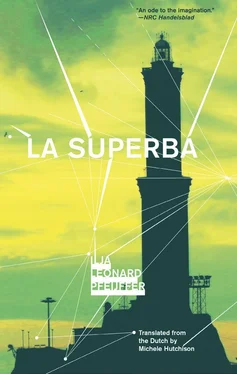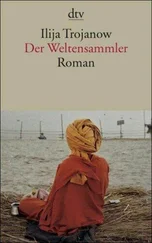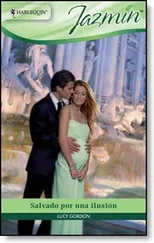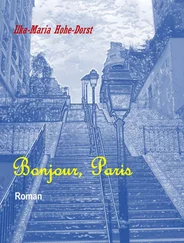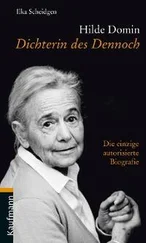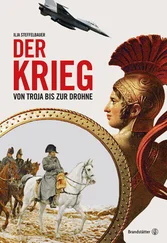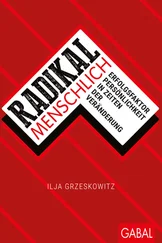“He decided to set aside his pride and ask for help. There was nothing else to do. He managed to trace his distant cousin.”
“Elena.”
“Elena, yes. And he borrowed a large sum of money from her. Part of it was for the crossing and with the rest he bought the most beautiful, expensive, chicest suit he could find.
“He was just in time. His mother was incredibly ill and weak but she was still alive. She was overjoyed to see him. And she was overjoyed to see him looking so good. ‘I’ve missed you terribly all these years,’ she said in a weak voice, tears in her eyes. ‘But my one consolation has been knowing that you’ve become rich and successful. You wrote so nicely about your new life. Thank you for writing faithfully every week to tell me about it. Since you left, your letters have been the most important thing in my life. Thank you.’ With a happy smile on her face, she breathed her last breath.”
“His father.”
“Yes. It turned out that his father had been writing letters every week on his behalf and making up excuses to go into the city every week to post them.”
“And then?”
“That’s where the story ends.”
“You did make it up, didn’t you?”
“Yes. But knowing that it was true.”
“You’re right. I’m sure it happened like that. It must have happened like that at least once, even though he might not have been called Alessandro. I think I saw a film once with almost the same story, only it wasn’t about an Italian in New York but a different kind of immigrant.”
“It still happens. People still lose their way in their dreams. And people still do everything they can to keep the fairy tale alive.”
“But it’s a wonderful story. We’ll definitely have to use it in our play. But better still would be if we could work in the story of Monia and your suit in some kind of way. That would give a nice contrast. The upscale immigrant, the expat who buys an expensive suit so he can go to the opera with his rich, older mistress…”
“And the poor sod who gets himself into debt trying to make his mother happy with a dream. And then to think that whole business with the opera suit was only to make our own dreams come true of getting a theater in which we can put on the play about the painful contrast.”
“Self-referential theater.”
“Yep. We’re sure to make a splash.”
17.
But it didn’t sit well with me, that whole story about the nine-year license and paying rent to the council — and of course it didn’t sit well. I decided to investigate. I could go to City Hall and simply ask for the relevant documents, couldn’t I? If it was a matter of a license and rental, it meant it was a public case and therefore the contract necessarily had to be public. And if it wasn’t, it was something else and then we were a bit further. But Pierluigi himself had said this was the situation, so those documents were probably available.
Genoa’s City Hall is a charming palazzo halfway along Via Garibaldi, opposite Vico del Duca. It has prominent neighbors, like museums and the fancy head offices of foreign banks. Via Garibaldi, which used to be called Strada Nuova, is the jewel in Genoa’s crown, built to astonish and amaze — a milestone in classical architecture. Rubens walked around making sketches of it. Many Genoese who live outside of the center perceive that street as the edge of the abyss. They dare venture this far and no farther into the labyrinth. The side alleys lead straight into the jungle in their eyes, a place where, within a hundred meters, you’ll fall prey to prostitutes, pimps, and knife fighters. And it’s not even totally untrue. Incidentally, our future theater was positioned right there in the jungle where no decent Genoese dared to go. That was something else to consider, I realized. But I would concern myself with that later.
I went and stood at the counter in City Hall. But that wasn’t the way it worked. I was given to understand that I had to take a numbered ticket and wait my turn. I apologized. I hadn’t noticed the ticket machine. I took number 814. I looked at the display. The number at that moment was 409. I waited to see how quickly the line moved. There was only one window open and after fifteen minutes, number 409 was still involved in a number of very special and particularly time-consuming transactions. Number 410 took about a quarter of an hour, too. I began to add up. In any case, I had plenty of time to go outside and smoke a cigarette in the street and come up with a plan.
As I stood outside smoking, a tramp spoke to me. I tried to ignore him. But he was persistent. “Thank you,” I said. He reached into his trouser pocket and pulled out a small piece of paper. Number 430. “Ten euros,” he said. I decided to pay him. “And your number?” he asked. “Swap.” I gave him number 814. “That’ll be the day after tomorrow,” he said. “If we’re lucky. Give me an extra five euros and we’ll stay friends.”
Two hours later, it was my turn. I explained why I’d come. Although my Italian was quite good by now, I had to explain my request three times in different ways and even then she didn’t understand me. On my insistence, on my firm insistence, as number 431 behind me began to break out in a rash, she fetched her manager. I explained it all once again. He asked for my ID. I was prepared for that. I laid my passport on the counter with a triumphant gesture. He picked it up as though it was a rare incunabulum and began to study it at length. He shook his head.
“The information you are requesting is unfortunately not authorized.”
“You mean that you’re not authorized to give me the requested information.”
“You said it.”
“So what now?”
He shrugged and turned to walk away.
“Come back, you bastard!” Behind me, number 431 held his breath. It was starting to get interesting. “I’m a citizen of the European Union and I know my rights. Allow me access to the documents I want to see or I’ll drag you to the Strasbourg courts.”
That made an impression. He humbly retraced his steps. He fished a document out of a drawer and stamped it with great pomposity. He handed it to me.
“What is this?”
“You are hereby authorized to present your request to the other office.”
“Which other office?”
“Matitone.”
“And that’s where they keep the documentation?”
He smiled apologetically. “I’ve done my best, sir. I’ve done more for you than is actually allowed. Thank you. Perhaps I could be of further service with a lottery scratch card?” With a compassionate smile that expressed sympathy for my quest, he withdrew to the recesses of his splendid palace.
18.
“ Matitone ” means “giant pencil.” And that’s what it looks like. A hexagonal block of flats with a pointed roof. The council’s pride and joy. Built by the mayor’s wife’s construction company. But tendered completely transparently and according to the rules, of course. Taller than the famous lighthouse. A new landmark for the modern city. Genoa doing credit to its age-old nickname — La Superba. A skyscraper in the old port. Visible clear across the city. The term “visual pollution” had never had such a golden ring to it. And because there wasn’t a single company that wanted to have its offices there, the council moved in themselves. You’re either a mayor or you aren’t. You do things for the people. You do things for your friends.
I have to say, it’s the perfect auxiliary branch to City Hall because it’s high and inaccessible. It’s Kafka’s castle. It is visible everywhere, but just try getting there. In theory it should take an hour to walk there from the center, but were it not for the two motorways you have to cross. You can also try the Metro to Dinegro, but there are rumors about people never coming back.
Читать дальше
